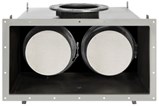Johnson Matthey Introduces New And Improved Low-Profile Carb Verified Crt(+) Diesel Particulate Filter System

The redesigned, advanced passive regenerating diesel particulate filter (DPF) system reduces PM by more than 85 percent; HCs and CO by 70 percent; and meets the 2009 CARB NO2 limit of 20 percent
Johnson Matthey, which sets the standard for diesel engine PM emissions control, now offers a new and improved Low-Profile CRT(+) DPF system that not only reduces PM by more than 85 percent and HC and CO by 70 percent, but also meets the California Air Resources Board (CARB) NO2 limit of 20 percent.
The Low Profile CRT(+) is a passive regenerating DPF technology capable of operating at low exhaust temperature—well below that of all other DPFs, making the Low-Profile CRT(+) the most efficient DPF available. CARB has also verified that it can be applied to all stationary diesel generators used for emergency back-up or prime power.
Jeffrey Sherman, Business Manager for Johnson Matthey's Stationary Emissions Control (SEC) group said with its updated, innovative rectangular design, the Low-Profile CRT(+) is engineered for maximum performance and to fit all engine sizes.
"It is compact; easy to install; and has greater filtration capacity because it accommodates more filters in its smaller package," said Sherman. "Equally important, it provides easier access with its lower height (filters accessed from the clean side) and is offered in stainless or carbon steel with a high-temperature coating." Johnson Matthey's Low-Profile CRT(+) is compatible with ultra-low sulfur diesel (<15 ppm) or B20 biodiesel fuel, he added.
Sherman also said,"the Low Profile CRT(+) will lead to future compact designs, that are capable of multi-pollutant reductions to meet even lower emission limits."
While other filter systems may require a catalyst coating on the filter, the Low-Profile CRT(+) employs a novel two-component design in which the "flow-through" platinum-coated catalyst is positioned before and separate from the filter to protect the catalyst from soot.
About Johnson Matthey Stationary Emissions Control (SEC):
Johnson Matthey SEC is well known for its total systems approach to solving customer's emissions problems as well as a reputation for strong customer support at the field service level. SEC designs and supplies catalysts and engineers catalytic systems to control emissions of nitrogen oxides (NOx), carbon monoxide (CO), hydrocarbons (HC), volatile organic compounds (VOCs), hazardous air pollutants (HAPs) and particulate matter (PM). SEC is dedicated to the research, development and application of catalyst technology to improve quality of life by reducing air emissions.
About Johnson Matthey
Traded on the London Stock Exchange, Johnson Matthey is a specialty chemicals company focused on its core skills in catalysts, precious metals, fine chemicals and process technologies. The $15B company is 192 years old, employs around 9000 people in 30 countries and has been providing catalytic solutions for air quality problems for more than 30 years. The company is backed by a reputation for superior reliability, design, engineering and manufacturing, technological expertise and customer service.
For more information, visit www.jmsec.com
SOURCE: Johnson Matthey
